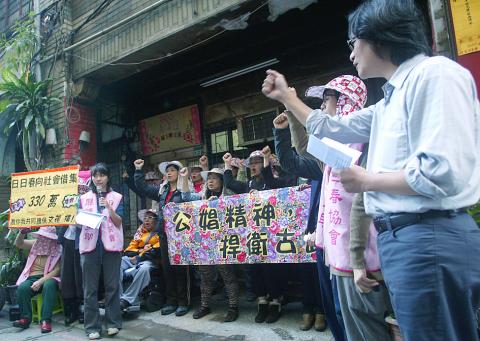A heritage site in Taipei that has preserved more than 70 years of history as a brothel, which was opened to the public under the management of the Collective of Sex Workers and Supporters (COSWAS), may have to close down because the new property owner had asked the group to move out of the building.
The Wen Men Building, a two-story building constructed in 1925, mainly served as a brothel for the working class during the Japanese colonial period. It became a legal brothel in 1956 and was a popular place for years until the Taipei City Government outlawed sex work in 1997, COSWAS secretary Wu Jo-ying (吳若瑩) said.
Licensed sex workers were totally banned in 2001, Wu said.

Photo: CNA
Inside the building were small rooms, each featuring a bed with floral-patterned sheets and a small dresser. Pictures of people who used to work in the building still hung on the walls, along with a faded notification paper from the city government in 1978 prohibiting people under the age of 20 from entering the building.
COSWAS, a group that supports licensed sex workers and promotes the legal working rights of women in the sex trade, had rented the first floor of the building for the past 14 years, using it as an office and an educational site for the public to learn about the history of the sex industry.
Although the building has been designated a municipal heritage site by the city’s Department of Culture Affairs in 2006, the new property owner, surnamed Liu (劉), who bought the building last year, filed a lawsuit against the group, asking it to move out.
The Shihlin District Court (士林地方法院) ruled against COSWAS last month, demanding the group vacate the building. The ruling has allowed Liu to proceed with the group’s eviction.
COSWAS and support groups held a press conference in front of the building yesterday morning, calling for the conservation of the cultural heritage site.
Wu said the group suspected that the new owner’s intention is to sell and profit from the transfer of development rights on a heritage site or for urban renewal after buying the land from the Bank of Taiwan.
COSWAS executive director Chung Chun-chu (鍾君竺) said the group had received funding from the Department of Culture Affairs in the past, but it was not informed of the property transfer until it was asked to move out by the new owner.
Wu said the department had neglected its duty by not giving the group pre-emptive rights, as stipulated in the Cultural Heritage Conservation Act (文化資產保存法), to purchase the building to preserve its cultural significance.
Based on the court’s ruling, the eviction can be temporarily halted if the group posts bond in the amount of NT$3.3 million (US$111,486), Wu said, adding that the group was seeking funding from the government as well as from the public.
John Liu (劉可強), a professor at National Taiwan University’s Graduate Institute of Building and Planning, said allowing former workers to narrate the building’s history was important in preserving the cultural meaning of Wen Meng Building.
Since the new Cabinet has said it would promote social justice, it should respect the history of such cultural sites.
“The government should allow cultural diversity in society and should not allow economic growth to take precedence over cultural values,” said Lee Hsiu-chien (李修鑑), a cultural history workshop owner.
COSWAS said it would appeal against the ruling and continue to seek support to keep the last remaining brothel heritage building.

Taipei has once again made it to the top 100 in Oxford Economics’ Global Cities Index 2025 report, moving up five places from last year to 60. The annual index, which was published last month, evaluated 1,000 of the most populated metropolises based on five indices — economics, human capital, quality of life, environment and governance. New York maintained its top spot this year, placing first in the economics index thanks to the strength of its vibrant financial industry and economic stability. Taipei ranked 263rd in economics, 44th in human capital, 15th in quality of life, 284th for environment and 75th in governance,

The Sports Administration yesterday demanded an apology from the national table tennis association for barring 17-year-old Yeh Yi-tian (葉伊恬) from competing in the upcoming World Table Tennis (WTT) United States Smash tournament in Las Vegas this July. The sports agency said in a statement that the Chinese Taipei Table Tennis Association (CTTTA) must explain to the public why it withdrew Yeh from the WTT tournament in Las Vegas. The sports agency said it contacted the association to express its disapproval of the decision-making process after receiving a complaint from Yeh’s coach, Chuang

Control Yuan Secretary-General Lee Chun-yi (李俊俋) tendered his resignation last night, admitting that he had misused a government vehicle, as reported by media. His resignation was immediately accepted by the Control Yuan. In a statement explaining why he had resigned, Lee apologized for using a Control Yuan vehicle to transport his dog to a pet grooming salon on May 20. The issue first came to light late last month, when TVBS News reported that Lee had instructed his driver to take the dog to the salon. The news channel broadcast photos that it said were taken by an unnamed whistle-blower, which purportedly showed the

A former officer in China’s People’s Liberation Army (PLA) who witnessed the aftermath of the 1989 Tiananmen Square massacre has warned that Taiwan could face a similar fate if China attempts to unify the country by force. Li Xiaoming (李曉明), who was deployed to Beijing as a junior officer during the crackdown, said Taiwanese people should study the massacre carefully, because it offers a glimpse of what Beijing is willing to do to suppress dissent. “What happened in Tiananmen Square could happen in Taiwan too,” Li told CNA in a May 22 interview, ahead of the massacre’s 36th anniversary. “If Taiwanese students or